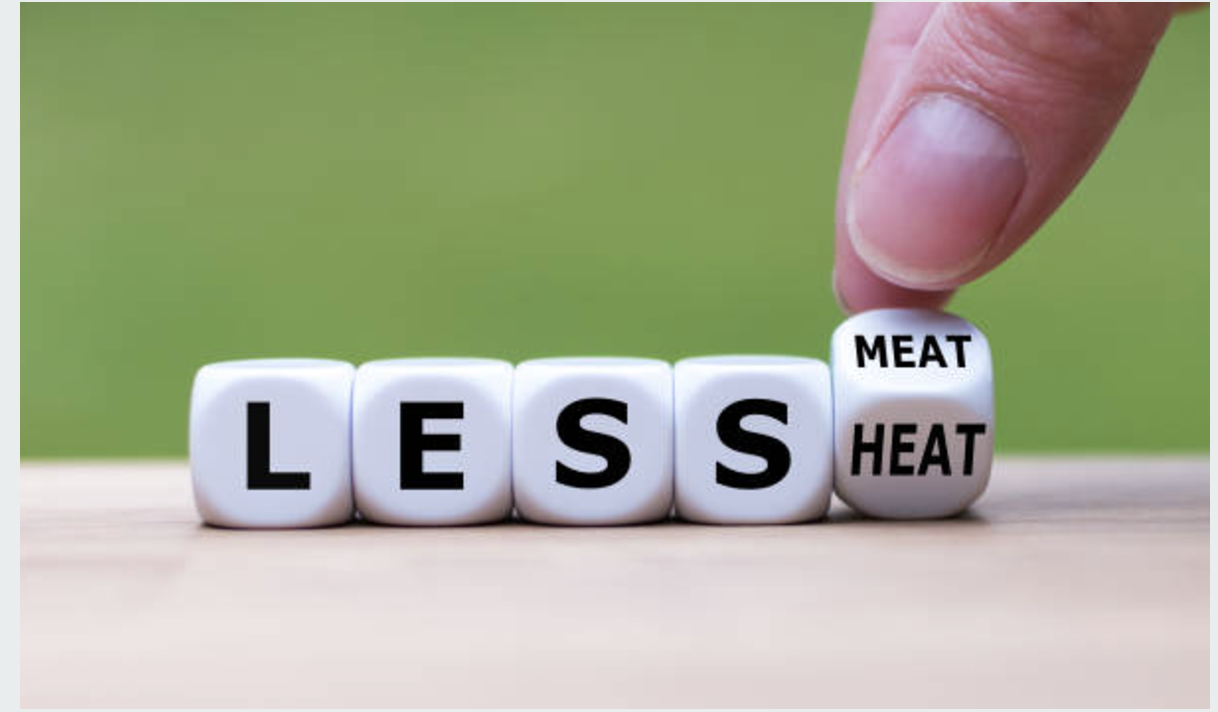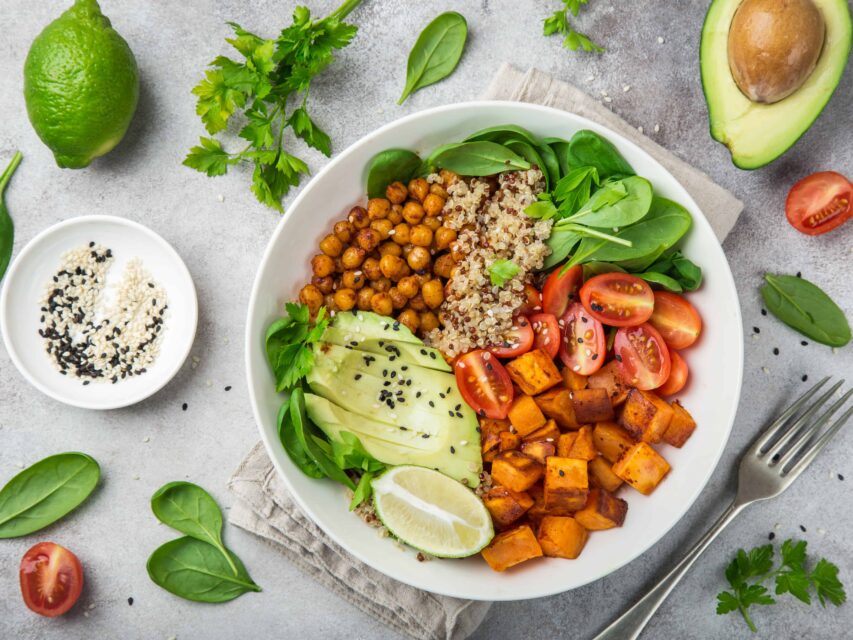At the start of the New Year, I finally caved and watched “Cowspiracy,” a documentary that delves into the environmental impacts of raising and consuming animals – particularly cows and poultry (AKA beef and chicken).
To be perfectly honest, I had been avoiding watching the film for a while. Why? Because I knew that if I opened my mind to the issue I would be forced to address it; and I, like many of you, loved a good hamburger.
Let me tell you right now: “Cowspiracy” makes one serious case for veganism. My mind has been changed, and I’ve never looked back.

The Issue With Meat
Some people say that a vegan who drives a Hummer is infinitely more environmentally-friendly than a meat-eater who bikes to work every day. Sound weird? Read on.
Facts About the Impacts of Animal Agriculture:
- Livestock and their byproducts account for at least 32,000 million tons of carbon dioxide (CO2) per year or about 15% of all worldwide greenhouse gas emissions.
- Emissions for agriculture are projected to increase 80% by 2050.
- Agriculture is responsible for 80-90% of all United States water consumption.
- 2,500 gallons of water are needed to produce just 1 pound of beef. 1,000 gallons of water are required to produce just 1 gallon of milk.
- Livestock covers 45% of the earth’s total land. Animal agriculture is the leading cause of species extinction, ocean dead zones, water pollution, and habitat destruction.
(Excuse me while I cry for a moment.) Are you freaking kidding me?!
Now here’s the flip side:
Each day, a person who eats a vegan diet saves 1,100 gallons of water, 45 pounds of grain, 30 square feet of forested land, 20 pounds CO2 equivalent, and one animal’s life. I’m no scientist, but all those stats I just overwhelmed you with are pretty dang convincing.
10 Reasons to Eat Less Meat (Or None At All)

1) You’ll reduce greenhouse gases and environmental destruction.
Nothing is accelerating climate change and environmental degradation more than the meat and dairy industry. If you call yourself an environmentalist, it’s probably time to put your foot (and your burger) down.
2) You’re likely to reverse heart disease.
Recent data suggests that replacing saturated, fat-rich foods like meat and full-fat dairy with foods that are rich in polyunsaturated fat (like nuts and seeds, for example) reduces the risk of heart disease by 19 percent.
3) You’ll save money.
Vegetarian and vegan meals tend to be significantly less expensive than meat. Bonus: You’ll never have to beg a butcher to let you use your glass jar at the counter again.
4) You’ll increase your physical endurance.
Many famous marathon-runners, triathletes, and ironmen/women follow a plant-based diet and excel. You don’t need meat to be strong, I promise. Just watch The Game Changers if you’re not convinced!
5) Your mind will be opened to new recipes.
I’ve had a blast researching new plant-based, vegetarian and vegan recipes! I’m trying meals I never would have considered before, and have been pleasantly surprised. I’ve also noticed that making plant-based meals is encouraging me to shop more in-season more than I used to.
6) You’ll reduce animal cruelty.
While animal cruelty was not my main motivation for transitioning to a plant-based diet, I can’t argue with it either. Millions of animals are killed each year for meat. A massive portion of which are raised exclusively in factory farms, a situation that brings about all sorts of cruelty, depression, and disease.
If you’d like to learn a little more about factory farm conditions, start here (non-graphic, I promise).
7) You’ll save the Amazon from destruction.
Have you heard the statistic that an acre of Amazon rainforest is demolished every second? One of the primary causes of this deforestation is the need for animal farmers to clear land for more and more livestock grazing. The Amazon is the earth’s lungs… please don’t let it die.
8) You’ll stay slim.
People on low-meat, vegetarian, or plant-based/vegan diets have significantly lower body weights and body mass. Similarly, consuming beans (a common meat alternative) results in higher intakes of fiber, protein, folate, zinc, iron, and magnesium. All good things!
9) You can limit your cancer risk.
Hundreds of studies indicate that diets high in fruits and veggies may reduce cancer risk! On the inverse, both red and processed meat consumption are tied to colon cancer. No thank you.
10) You may live longer.
Red meat and processed meat, in particular, are linked to increases in total mortality, cancer mortality, and cardiovascular disease mortality.
Eat Less Meat

If there is one thing I want you to take away from this blog post, it is that food is power. You have an incredible amount of influence in the palm of your hand. What will you do with it?
Reducing (or eliminating) your meat intake has innumerable benefits. You’ll contribute significantly to the causes of conservation and lowering greenhouse gas emissions, and you’ll look and feel better in the process.
Since I started eating a more plant-based diet:
- I’ve had more energy. I can run farther and faster than I ever could before.
- My skin has improved. I no longer get blemishes like I used to.
- We’ve saved a ton on our grocery bills. Meat really racks up.
- I’m less interested in snacking. And when I do snack, I turn to things that are good for me.
- I haven’t missed meat at all. Honestly, after just a few weeks of eating plant-based-only it’s started to make me queasy.
Second, eating local and in-season foods is a wonderful way to demonstrate your care for the environment.
Purchase your food in local farmers markets and cook recipes that use ingredients currently being grown. Tomatoes in summer; squash and tubers in fall and winter, etc.
I am, and will continue to be, a huge advocate of the plant-based diet, but I’m still transitioning! For example, I’m still eating eggs at the moment. And I am still finishing off the cheese we have in our fridge.
Don’t feel pressure to change your entire diet all at once; take it bit by bit.
Start by eliminating red meat, then chicken. Then slowly integrate plant-based meals into your weekly routine. Once you have some solid recipes you know you can count on, faze out the rest and see how it goes!
What really matters is where your heart is: Do you really want to make this planet a better place? Consider what that actually looks like, then go for it full speed.
Thinking of you all!
Learn more about the true impacts of animal agriculture or watch “Cowspiracy” on Netflix.

